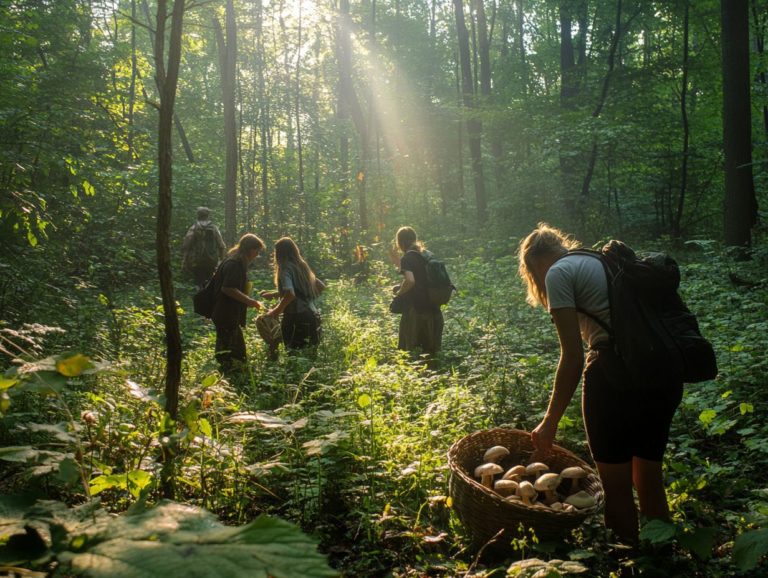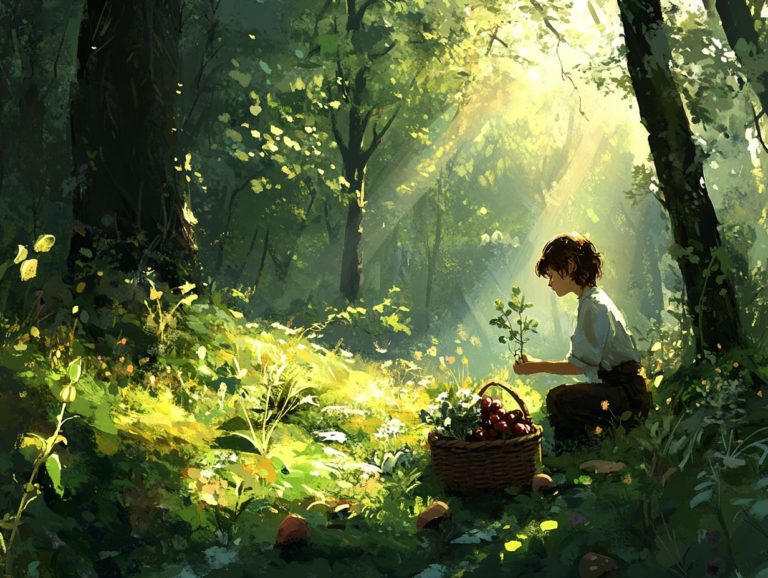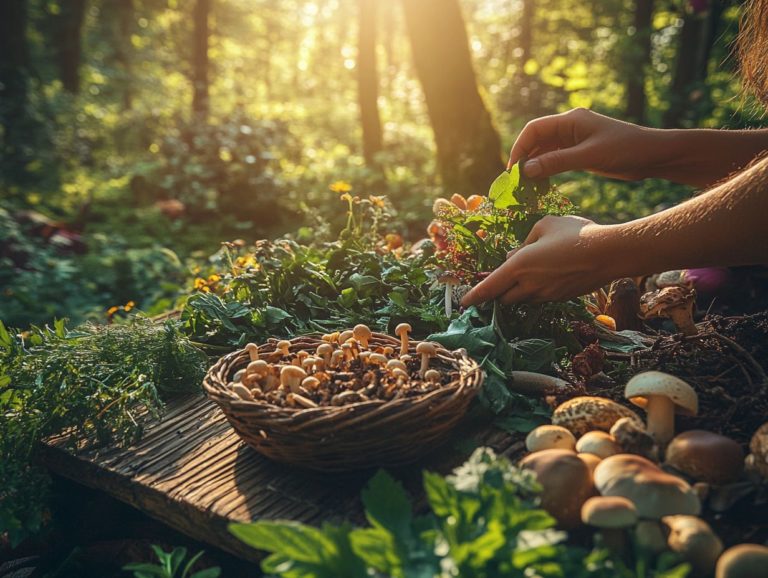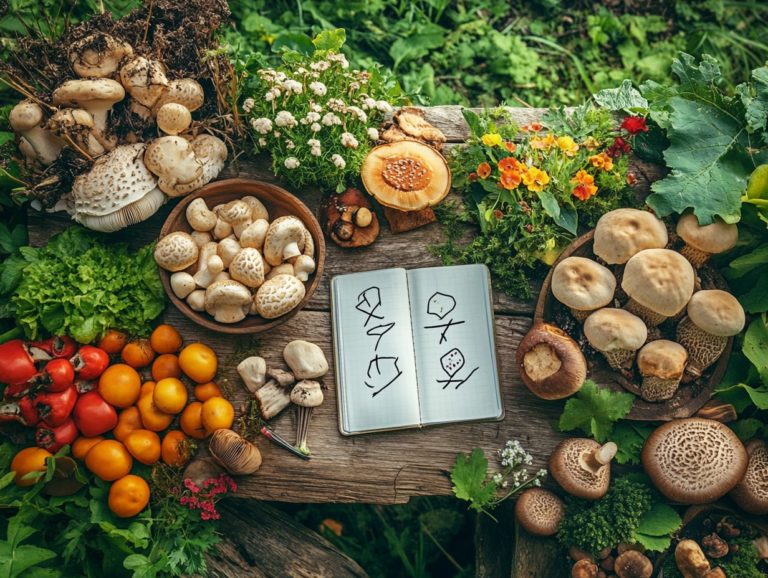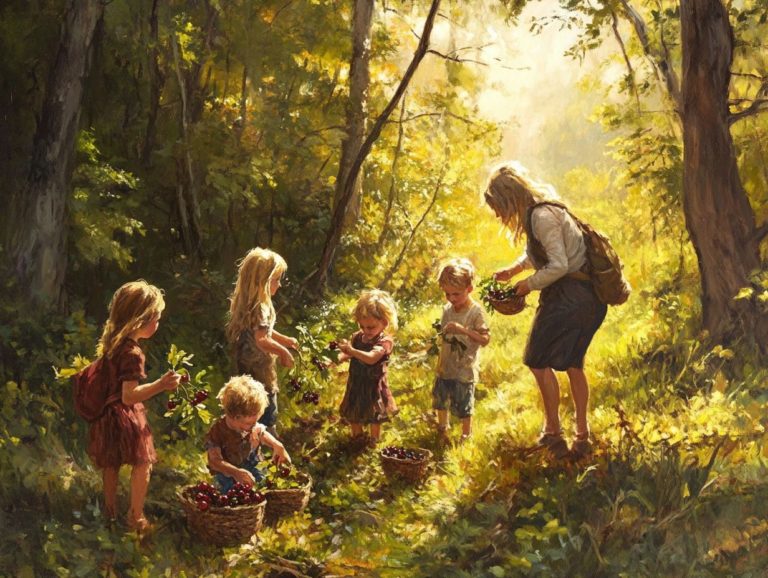Advanced Foraging Techniques for Experts
Foraging has transformed from a mere survival skill into a fulfilling hobby cherished by many.
Advanced foraging elevates this practice, providing seasoned gatherers with insights and techniques needed to identify, harvest, and process wild edibles safely and with integrity.
This article delves into the essential tools, advanced methods, and best practices that experienced foragers employ. It also highlights challenges encountered along the way and the remarkable rewards that stem from forging a deeper connection with nature through foraging.
Get ready to elevate your foraging skills to new heights!
Contents
- Key Takeaways:
- Tools and Equipment for Advanced Foraging
- Identifying and Harvesting Wild Edibles
- Advanced Foraging Techniques
- Safety and Ethics in Advanced Foraging
- Challenges and Rewards of Advanced Foraging
- Frequently Asked Questions
- What makes foraging techniques advanced for experts?
- What are the benefits of using advanced foraging techniques?
- What are some examples of advanced foraging techniques?
- Is there a risk involved in using advanced foraging techniques?
- How can I learn advanced foraging techniques?
- Can advanced foraging techniques be used for survival situations?
Key Takeaways:
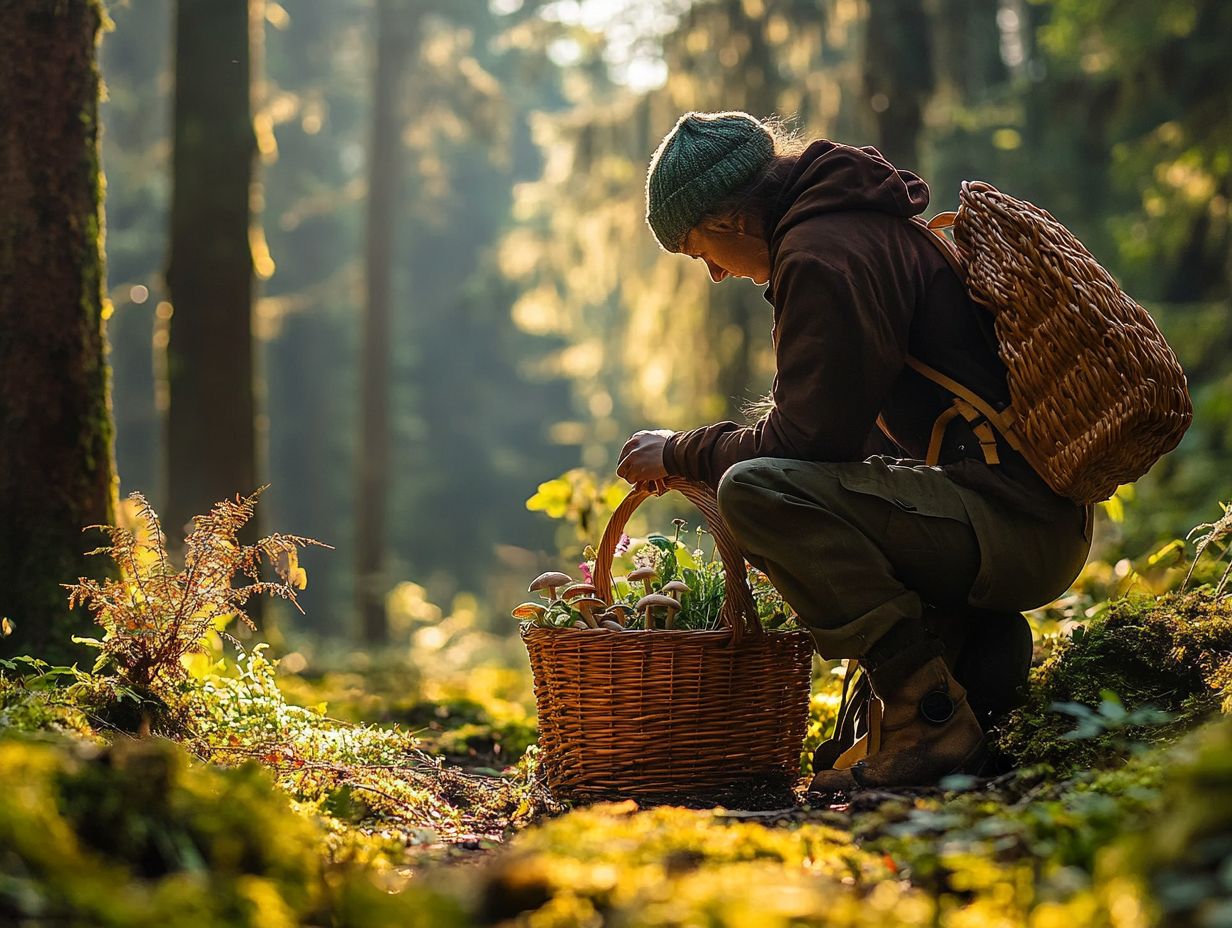
- Always carry essential gear such as a knife, compass, and plant identification guide when foraging to ensure safety and success.
- Develop a keen eye for identifying and harvesting wild edibles by learning about plant characteristics and their seasonal cycles.
- Use advanced foraging techniques, such as processing and preserving, to extend the shelf life of your harvest and maximize its potential.
What is Advanced Foraging?
Advanced foraging is a skillful practice that invites you to dive deeper into the world of wild food gathering. It’s not just about spotting edible plants and mushrooms; it’s also about understanding their nutritional benefits and their role in sustainable practices. For those starting out, exploring foraging techniques for beginners can help you learn methods that protect the environment while gathering food.
This practice helps you connect with nature, encouraging you to engage with your local landscape, recognize seasonal shifts, and weave ancestral knowledge into your foraging adventures.
Advanced foraging cultivates skills vital for herbal medicine and wildcrafting, enhancing both your health and your commitment to environmental stewardship.
By exploring the historical context of foraging, you can appreciate its evolution from a survival necessity into a modern culinary pursuit. Unlike basic foraging, which might settle for identifying familiar species, advanced foraging demands a nuanced understanding of diverse ecosystems and the interactions among plants. This deeper awareness enriches contemporary food culture, as chefs and home cooks alike increasingly seek local, sustainable ingredients to create unique dishes.
Visionaries like Sean Rowe and Tom Brown have crafted invaluable educational resources that inspire both newcomers and seasoned foragers to explore the rich world of wild edibles, promoting a lifestyle grounded in nutritional awareness and ecological respect.
Tools and Equipment for Advanced Foraging
Equipping yourself with the right tools and equipment is essential for mastering advanced foraging, as it significantly enhances your ability to identify, collect, and develop your own foraging techniques to utilize wild foods effectively.
The proper gear not only facilitates the harvesting of wild edible plants but also ensures your safety and efficiency in wilderness survival scenarios.
From specialized knives to foraging baskets, each tool in your arsenal serves a distinct purpose, ultimately deepening your connection to nature and fostering a greater appreciation for local biodiversity.
Essential Gear for Experienced Foragers
Experienced foragers like you understand the importance of a carefully curated collection of essential gear. This ranges from reliable knives and sturdy baskets for gathering wild food to comprehensive field guides that assist in plant identification and highlight nutritional benefits.
This thoughtfully selected gear not only enhances your foraging experience but also ensures your safety, which is crucial when navigating the sometimes tricky terrain of wild edibles. For example, a high-quality folding knife can significantly improve your efficiency when harvesting herbs and mushrooms. A well-crafted woven basket allows for easy transport while promoting proper ventilation, keeping your foraged treasures fresh. As renowned forager Samuel Thayer once said, “The right tools can transform an ordinary outing into an extraordinary adventure.”
Field guides, rich with vivid pictures and nutritional information, enable you to make informed decisions, enhancing both your safety and culinary creativity. Each piece of gear plays a vital role in connecting you to the land, enriching your understanding of nutrition and the environment around you.
Join the adventure of foraging and discover the wild flavors nature has to offer!
Identifying and Harvesting Wild Edibles
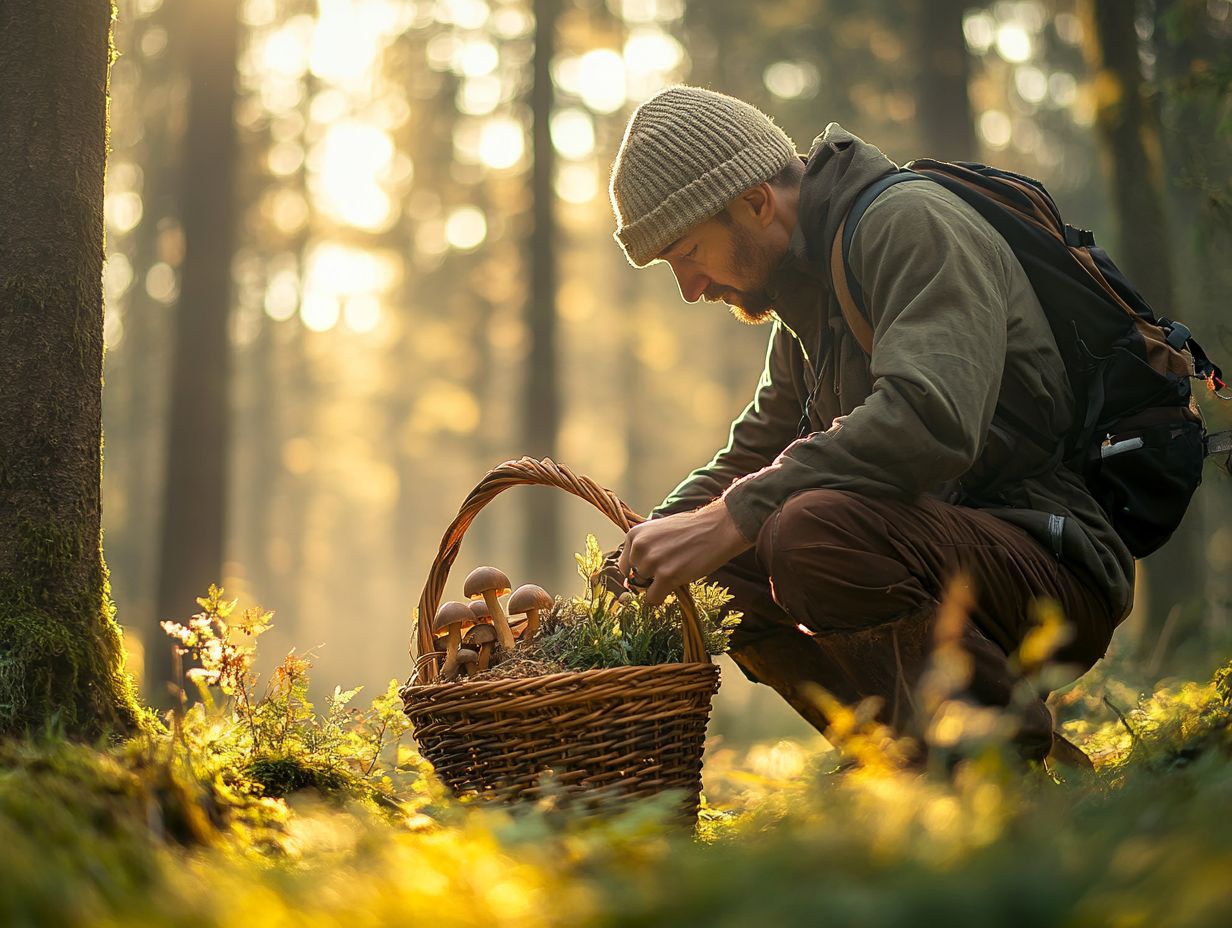
Identifying and harvesting wild edibles demands a blend of knowledge and practice. As you navigate through an array of edible plants and mushrooms, it’s essential to respect the principles of sustainability and seasonal foraging.
By understanding the features and homes of various wild edible plants, you elevate your ability to distinguish between safe and toxic species. This journey enriches your nutritional intake and deepens your appreciation for the local landscape.
The incredible diversity of nature is something to cherish.
Tips for Finding and Collecting Wild Foods
Finding and collecting wild foods can be an enriching experience! Equip yourself with essential foraging tips that emphasize plant identification and sustainable practices.
Familiarize yourself with the local flora, paying attention to distinctive features like leaf shapes, flower colors, and growth patterns. Timing is everything in seasonal foraging; certain plants may only grace you with their presence during specific months.
Engaging with community gardening groups greatly enhances your knowledge. You receive practical insights from seasoned foragers. In terms of harvesting, always embrace responsible techniques: take only what you need, leave enough for wildlife, and respect private properties to maintain harmony within the ecosystem.
By doing this, you not only enrich your diet but also make a positive contribution to your community.
Advanced Foraging Techniques
Advanced foraging techniques offer you an array of methods for processing and preserving wild edibles, equipping you with skills essential for wilderness survival. This enables you to fully harness the nutritional benefits of the plants and mushrooms you gather.
These techniques seamlessly connect foraging with cooking. They blend traditional methods with modern culinary practices to elevate the role of wild foods in your everyday meals.
Methods for Processing and Preserving
Processing and preserving wild edibles is essential for you to savor the fruits of your foraging efforts throughout the year. It also unlocks a treasure trove of herbal remedies and nutritional benefits.
This practice not only helps you retain the vibrant flavors and vital vitamins present in these plants. It transforms your foraged bounty into a vital resource during off-seasons.
You have a myriad of methods at your disposal, from dehydration to fermentation, each offering its own unique advantages. For instance, drying herbs can amplify their flavor and extend their shelf life, making them perfect additions to teas or seasoning blends.
Fermentation preserves wild edibles while enhancing their probiotic qualities, which can be a boon for your gut health. Creating tinctures or infused oils allows you to capture the essence of these plants, turning them into powerful herbal remedies.
By understanding the nutritional value of wild edibles like nettles or dandelions, you enrich your diet with wholesome ingredients that might otherwise go unnoticed.
Safety and Ethics in Advanced Foraging
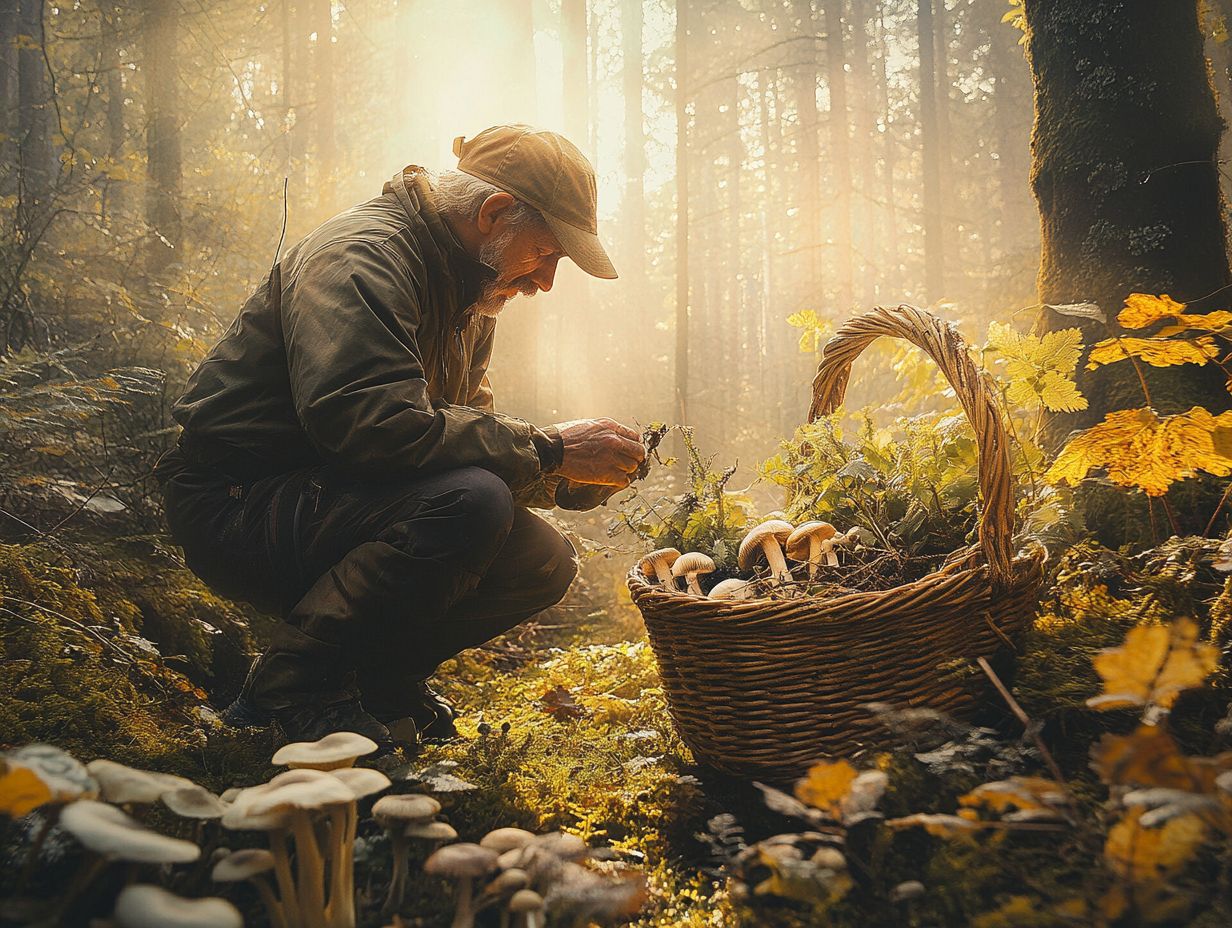
Safety and ethics should be at the forefront of your advanced foraging practices! Ensure that you honor both the environment and the cultural heritage tied to wild food gathering.
It s crucial for you to grasp the ecological balance of local ecosystems. Being aware of invasive species and their impact on native plants will shape your foraging experience.
By adhering to ethical guidelines, you contribute to the sustenance of biodiversity. You also help cultivate a responsible and respectful foraging community.
Precautions and Considerations
Taking precautions and considering various factors is essential for you as a forager to ensure your safety while gathering wild edibles and to protect the environment from the harmful effects of invasive species.
You must be diligent in properly identifying each plant, as many edible varieties have toxic look-alikes that pose serious health risks. Rely on reputable guides or apps, and engage with local foraging communities where experienced members can offer invaluable advice.
By fostering a culture of shared knowledge about safe practices, you enhance your own safety and contribute to environmental stewardship. Responsible management of wild locations helps preserve biodiversity, benefiting both you and the natural world around you.
Challenges and Rewards of Advanced Foraging
Advanced foraging has both challenges and rewards. This practice invites you into the realm of wild food gathering, where the quest for knowledge connects you deeply to nature while offering health benefits and fostering a sense of community. Exploring the art of foraging can enhance your experience even further.
Engaging in this practice enriches your understanding of the natural world, enhances your well-being, and strengthens your ties with others who share your passion.
Experiences and Benefits of Expert Foragers
The experiences of expert foragers provide insights into nature exploration, heritage, and overall health.
As you venture into the wilderness, you ll likely encounter transformative moments like the thrill of discovering a hidden patch of wild blueberries that tantalizes your taste buds and reconnects you with ancestral traditions passed down through generations.
These encounters deepen your appreciation for the natural world and nurture a sense of stewardship for local ecosystems. Many foragers share stories about the health benefits of including wild edibles in their diets, recounting improvements in energy levels and overall well-being from nutrient-rich offerings found right outside their doors.
Each forage becomes a bridge to personal mindfulness and a profound respect for nature s abundant gifts.
Frequently Asked Questions
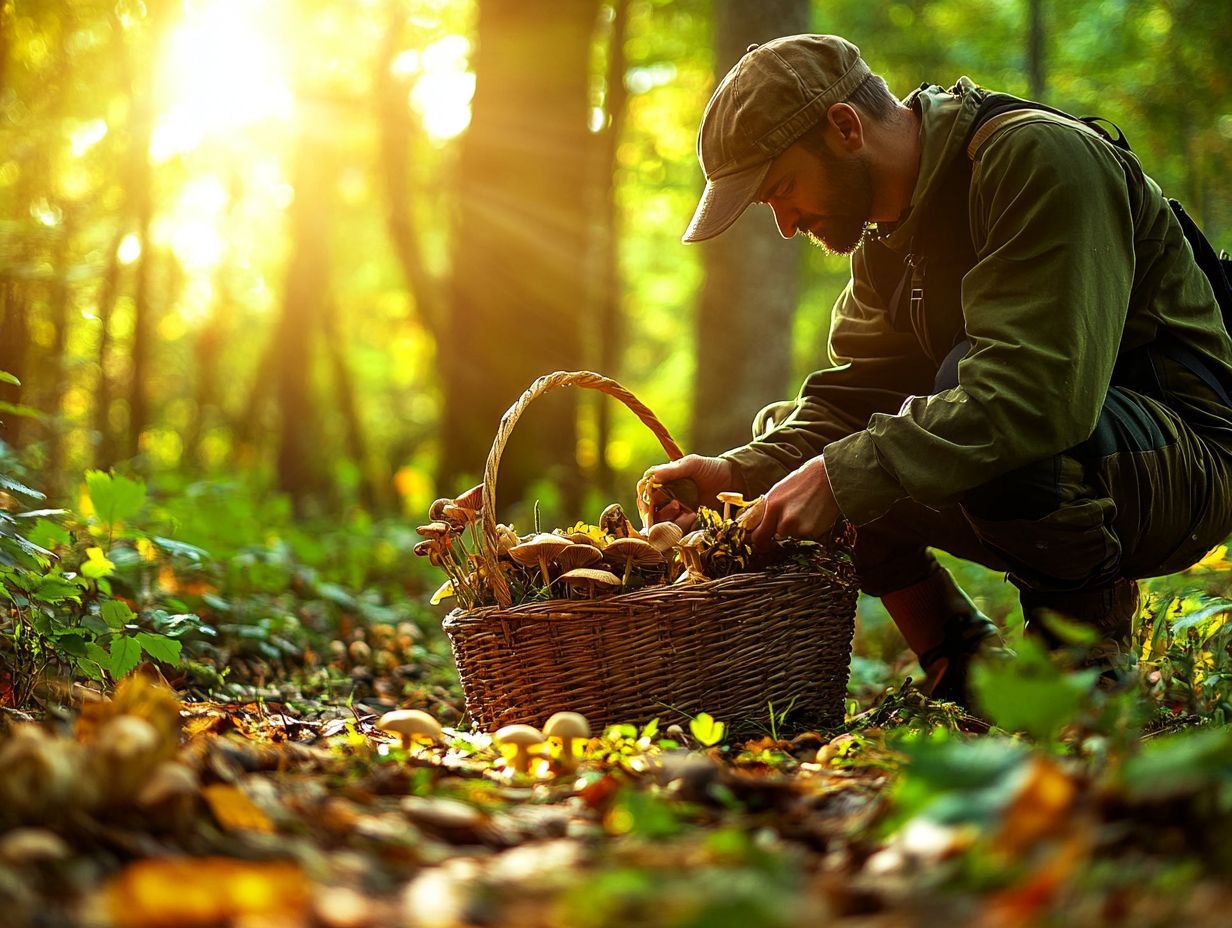
What makes foraging techniques advanced for experts?
Advanced foraging techniques refer to specialized methods used by experienced foragers to gather and harvest food in the wild, making it beneficial to learn foraging techniques for outdoor enthusiasts.
What are the benefits of using advanced foraging techniques?
Using advanced foraging techniques increases efficiency in gathering food and deepens your connection to nature and the environment.
What are some examples of advanced foraging techniques?
Examples include using advanced tools like traps and snares, knowing specific plant and animal species, and exploring the future of foraging techniques to identify alternative food sources.
Is there a risk involved in using advanced foraging techniques?
Yes, there is some risk, as these techniques require specialized knowledge. Foragers should thoroughly understand their methods to ensure safety and environmental sustainability.
How can I learn advanced foraging techniques?
Attend workshops or classes led by experienced foragers. Reading books, articles, and practicing in the field will help you develop advanced skills, including understanding the evolution of foraging techniques.
Can advanced foraging techniques be used for survival situations?
Yes, they can be extremely useful in survival situations by helping foragers find food efficiently and sustainably. Always prioritize safety and sustainability in any survival context.
Ready to start foraging? Explore local workshops today!


